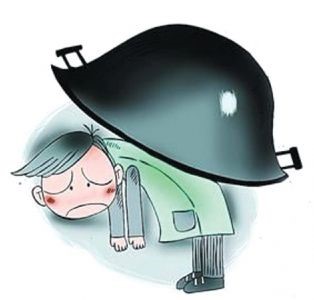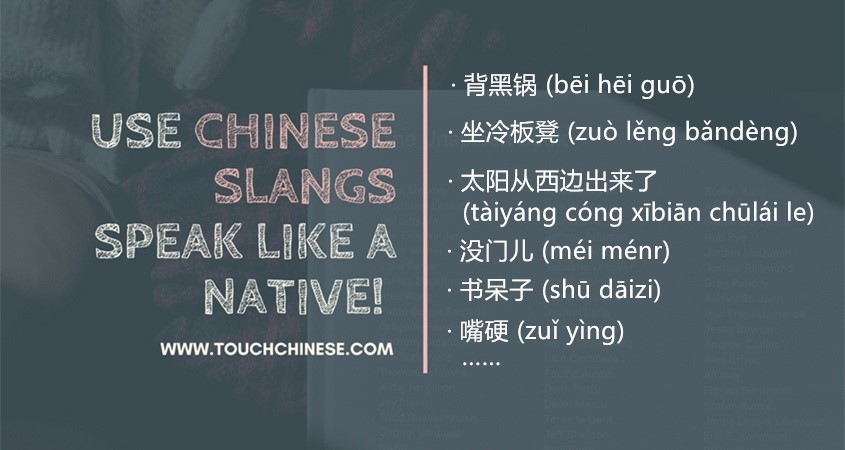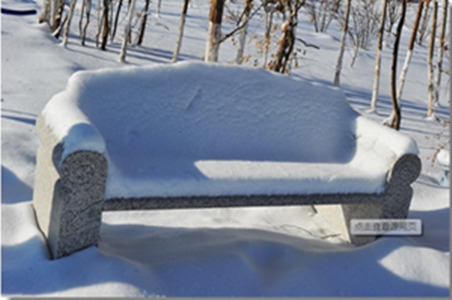Slang is a kind of informal language which actually means other things, instead of its literal meaning. All languages have slang, and Chinese is no exception.
We all know plenty of English slang. For example, the expression ‘hit the road’ does not really mean to hit the road. It means ‘Let’s go!’ ‘It’s raining cats and dogs’ doesn’t mean that there are many animals falling down from the sky. It means ‘it’s raining heavily.’
Here are some typical Chinese slang:
背黑锅 (bēi hēi guō)
Meaning: take the blame for others; be made a scapegoat

“背”means that you carry something on your back. “黑锅”literally means a black pot, but it actually means scapegoat. As a whole, this phrase means ’ to take the blame for others’.
E.G.
你应该说实话,不能让他背黑锅。
(Nǐ yīnggāi shuō shíhuà,bù néng ràng tā bēihēiguō.)
You should tell the truth. You can’t make him take the blame for you.
坐冷板凳 (zuò lěng bǎn dèng)
Meaning: be given the cold shoulder
“坐”means sit. “冷”means cold. “板凳”means bench. ‘坐冷板凳’ talks about the people who are ignored and thus, not given attention for some reason.
E.G.
因为他上个赛季犯规太多,所以本赛季经常坐冷板凳。
(Yīnwéi tā shàng gè sàijì fànguī tài duō,suǒ yǐ běn sàijì jīngcháng zuò lěng bǎndèng.)
He broke the rules too much last season. So he is being given the cold shoulder this season.
太阳从西边出来了 (tàiyáng cóng xībiān chūlái le)
Meaning: a rare and surprising event (the English equivalent is “one for the books.”
“太阳”means sun; “从西边”means from the west; “出来”means comes out. So the whole sentence means ‘the sun rises from the west’. We all know that sun rises from the east. Thus, “太阳从西边出来了”means that something rarely happens and you feel surprised.
E.G.
他今天早上6点就起来了,真是太阳从西边出来了。
(Tā jīntiān zǎoshang 6 diǎn jiù qǐláile, zhēnshi tàiyáng cóng xībian chūláile.)
He got up at 6 this morning. That’s one for the books!
没门儿! (méi ménr!)
Meaning: No way!
“没” is the short way of “没有” in spoken Chinese. “门”means “门路”, or road This phrase means “No way. That’s impossible.” It originated from a dialect, but it’s now used widely in mandarin.
E.G.
我可以借你的车吗?没门儿!
(Wǒ kěyǐ jiè nǐ de chē ma?méi ménr !)
Can I borrow your car? No way!
给你点颜色看看 (gěi nǐ diǎn yánsè kànkàn)
Meaning: teach you a lesson
“给你”means “to you.”“颜色”means “color.” “看看”means “to have a look.” As a whole, it means I’m going to teach you a lesson.
E.G.
你最好注意你说话的语气,否则给你点颜色看看。
(Nǐ zuìhǎo zhùyì nǐ shuōhuà de yǔqì,fǒuzé gěi nǐ diǎn yánsè kànkàn.)
You’d better pay attention to your tone. Or I’ll teach you a lesson.
书呆子 (shū dāi zi)
Meaning: nerd
“书”means book; “呆子”means idiot; “书呆子”means “nerds”–people who are ridiculed for studying excessively.
E.G.
他每天都在看书,是个书呆子,不会社交。
(tā měitiān dōu zài kànshū,shì gè shūdāizi,bú huì shèjiāo)
He reads every day. He is such a nerd, and not good at socializing.
嘴硬 (zuǐ yìng)
Meaning: Stubborn and reluctant to admit mistakes.
“嘴”means mouth; “硬”is hard(opposite of soft). But here it’s about the attitude instead of texture. It means to take a tough stance. “嘴硬” actually means someone who is stubborn and reluctant to admit his mistakes or errors.
E.G.
他就是嘴硬,不肯承认错误。
(Tā jiù shì zuǐyìng,bù kěn chéngrèn cuòwù.)
He didn’t want to admit that it’s his mistake.
脚踩两只船 (jiǎo cǎi liǎng zhī chuán)
Meaning: to two-time someone

“脚”means foot. “踩”means tread. “两只船”means two boats. This expression literally means that someone stands on two boats at the same time. It actually means that someone two-times the other one during a relationship.
E.G.
Rose和Jin分手了,因为Rose发现Jin一直脚踩两只船。
(Rose hé Jin fēnshǒu le,yīn wéi Rose fāxiàn Jin yīzhí jiǎo cǎi liǎng zhī chuán.)
Rose and Jin ended their relationship, because Rose found out that Jin had been two-timing her.
From the above examples, you can see that Chinese slangs are vivid, wise, and amusing. It can help your conversation go more smoothly If you understand their real meaning. But more than that, if you can not only understand but also know how to use them in dialogue, it will make you more confident in conversing in Chinese, and it will make you also sound impressive.


